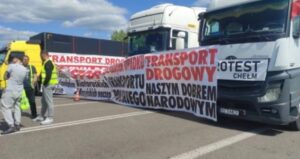
The Union of Road Hauliers of Slovakia (UNAS) has announced its decision to resume blocking truck traffic through the Slovak border crossing point Vysne Nemecke-Uzhhorod on Monday, December 11, according to the UNAS Facebook page on Sunday.
“The Union of Road Carriers of Slovakia (UNAS) decided on 10.12.2023 to extend the protest at the Vysne Nemecke/Uzhhorod border crossing from 11.12.2023 from 15:00 until further notice,” the statement reads.
The carriers warn that they will “block the entry to the territory of the Slovak Republic for freight transportation. Personal transportation will not be restricted in any way.”
“This decision was made by the Presidium based on an assessment of the information received and its impact on the Slovak road transport market. We join the protests organized in Poland from 06.11.2023 and from 11.12.2023 also in Hungary,” UNAS said.

The Internet Association of Ukraine has proposed to the National Bank a transparent and legal mechanism for blocking phishing domains. This is stated in a letter from the IAU to the NBU.
Currently, in accordance with the regulations of the NCU, which was implemented by the Order of January 30, 2023 No. 67/850, the mechanism for blocking domains is as follows:
– The NBU creates and provides the National Coordination Center for Cybersecurity under the National Security and Defense Council (hereinafter referred to as the NCCC) with a list of phishing domains;
– The NCCC places this list on its “transit” server, from which providers are obliged to receive it;
– Internet service providers are obliged to configure their DNS servers in such a way that Internet users are redirected to the NCCC landing page without their knowledge and consent in case of requests for domains from the list;
Thus, if an Internet user intends to visit a domain included in the list, he or she will be redirected to the NCCC server.
Section 9 of the Regulation provides that the NCCC server collects and stores detailed information about Internet users who have been redirected to this server, namely:
When a user navigates to a landing page, the System stores technical information, including the date and time, IP address (subnet) from which the transition is made, domain name or URL of the phishing page to which the transition is made, user-agent, etc., and unspecified government agencies are granted access to the above information.
Thus, the NCCC unlawfully collects, stores, uses and disseminates confidential information about a person, such as information that discloses details of the person’s actions on the network (which domain was intended to be visited, the date and time of the visit attempt, the IP address from which the domain was visited).
What the EBA suggests
In a letter to the National Bank regarding the phishing domain filtering system, the EBA proposes that the NBU introduce a legal and transparent mechanism for blocking phishing domains.
It is as follows:
– The NBU compiles and constantly updates the list of phishing domains (as it is currently doing);
– The NBU provides Internet providers with access to this list from its server (without using a third-party “transit” server);
– Internet service providers voluntarily download this list, having the opportunity to send to the NBU a reasoned refusal to block a particular domain, which will reduce the likelihood of erroneous blocking of domains that are not phishing;
– if an Internet user tries to visit one of the domains on the list, he or she is redirected to a landing page hosted by his or her provider, which solves the problem of unlawful violation of the confidentiality of user information.

Creditwest Bank (Kyiv) unreasonably blocks the property that is pledged by it on the repaid loan, the owner of the group of companies Voda UA, Karpatska Dzherelna Vysokohirna, Horianka, Dmytro Nikiforov, has said.
“After all obligations under the loan agreement have been fulfilled, the bank continues to hold the property in pledge, conducts incomprehensible correspondence and constantly asks us to provide certain documents regarding financial reporting, our turnover in other banks,” he said at a press conference at the Interfax-Ukraine agency.
“They made it very clear to us … that they are not going to release pledge from our property,” Nikiforov added.
According to him, the obligations of his companies on the loan to Creditwest Bank were fulfilled on October 1 and, according to the loan agreement, the bank had to remove the encumbrance from the pledge within five days.
Nikiforov clarified that in 2018 the companies attracted a loan from Creditwest Bank in the amount of UAH 15 million to replenish working capital and finance investment projects. Later, according to the owner, he sold one of the companies that was the borrower for this loan, and after a while this company stopped serving him.
For the purpose of settlements, Nikiforov began to negotiate with the bank, at the same time the bank sold the corresponding non-performing loan to a financial company owned by the persons who own the company that stopped servicing the loan, the owner of Voda UA noted.
“Later, the financial company, bypassing the lender, tried to contact me to recover my property as a surety to repay this loan … In this case, we see a very clear algorithm for removing the unscrupulous borrower from liability,” Nikiforov said.
In his opinion, Creditwest Bank can block the pledge in the interests of the partner of its chairman of the board.
“When the story with the loan transfer took place, chairman of the board Ihor Tikhonov … suggested that I transfer part of the business to my business partner. On what conditions I didn’t listen, as I interrupted the conversation,” Nikiforov said.
He stressed that he plans to collect funds from the bank in accordance with the procedure established by law for each day of delay in the unreleased encumbrance from the pledge. In addition, Nikiforov is going to apply to law enforcement agencies regarding possible personal corruption motives of the bank’s management.
ACCUSES, BLOCKING, CREDITWEST BANK, PROPERTY, TURKEY, VODA UA